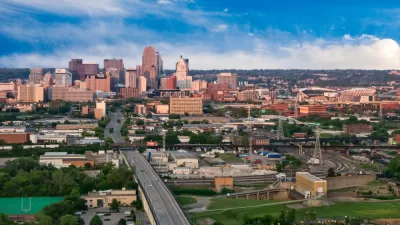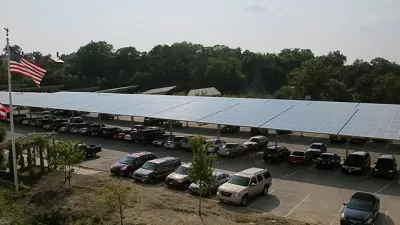Almost all of Cincinnati's police and fire stations, health clinics, recreation centers, and administrative buildings will run on renewable energy.
The city of Cincinnati will purchase 100% renewable energy for most of its municipal facilities, thanks to a contract signed recently with Dynegy.
Katie Pyzyk reports on the new contract, which "will cut the city's greenhouse gas emissions by more than 9% and its utility rates by more than $100,000 annually."
The deal also furthers the city's commitment to green energy, which had a year full of accomplishments. Pyzyk explains:
Over the summer, leaders announced that the Greater Cincinnati Water Works would end its use of coal power and switch to solar. That plan involves installing what leaders say is the largest municipal solar array in the country, covering up to 150 acres of city property.
And:
Cincinnati also has an electric aggregation program that provides green energy for about 80,000 households. Last year the program reportedly saved residents $1.5 million on electricity and $2 million on natural gas.
For more details on the deal, see also an announcement published on the city of Cincinnati's website.
FULL STORY: Cincinnati signs deal to run most facilities on 100% green energy

Maui's Vacation Rental Debate Turns Ugly
Verbal attacks, misinformation campaigns and fistfights plague a high-stakes debate to convert thousands of vacation rentals into long-term housing.

Planetizen Federal Action Tracker
A weekly monitor of how Trump’s orders and actions are impacting planners and planning in America.

Chicago’s Ghost Rails
Just beneath the surface of the modern city lie the remnants of its expansive early 20th-century streetcar system.

Bend, Oregon Zoning Reforms Prioritize Small-Scale Housing
The city altered its zoning code to allow multi-family housing and eliminated parking mandates citywide.

Amtrak Cutting Jobs, Funding to High-Speed Rail
The agency plans to cut 10 percent of its workforce and has confirmed it will not fund new high-speed rail projects.

LA Denies Basic Services to Unhoused Residents
The city has repeatedly failed to respond to requests for trash pickup at encampment sites, and eliminated a program that provided mobile showers and toilets.
Urban Design for Planners 1: Software Tools
This six-course series explores essential urban design concepts using open source software and equips planners with the tools they need to participate fully in the urban design process.
Planning for Universal Design
Learn the tools for implementing Universal Design in planning regulations.
planning NEXT
Appalachian Highlands Housing Partners
Mpact (founded as Rail~Volution)
City of Camden Redevelopment Agency
City of Astoria
City of Portland
City of Laramie





























